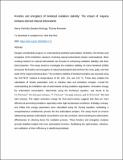| dc.description.abstract | The integration of solar energy into microgrids poses significant challenges in maintaining power quality due to the variable nature of solar generation and the presence of nonlinear loads such as uninterruptible power supplies (UPS), variable frequency drives (VFDs), rectifiers, and power electronic components. Active power filters are often used to mitigate harmonics; however, these solutions are complex due to the use of control techniques like the synchronous reference frame and can introduce additional harmonic currents during compensation within electrical systems. This study investigates the effects of different nonlinear loads on the power quality of solar microgrids and explores the reduction of harmonics from VFDs through the application of passive harmonic filters (PHFs). The objective was achieved by measuring harmonics generated by nonlinear loads and simulating a modeled VFD circuit using MATLAB/Simulink R2021b software, considering the demand side. Analysis of current harmonics measurements at the point of common coupling revealed that the total harmonic current distortion (THCD) for UPS, VFDs, and rectifiers was 20.64%, 42.82%, and 22.59%, respectively, while the total harmonic voltage distortion (THVD) for UPS, VFDs, and rectifiers was 27.83%, 31.55%, and 29.16%, respectively. Moreover, the total losses caused by harmonic distortion from these nonlinear loads is 860 Watts. Among these loads, VFDs were the dominant source of harmonics. Therefore, the application of passive harmonic filters (PHFs) was proposed to minimize harmonics in solar microgrids, adhering to the standards set by the Institution of Electrical and Electronics Engineers (IEEE) and the International Electro‐Technical Commission (IEC). Simulation of the VFD revealed that the THCD was reduced by 89.4% and the THVD was minimized by 89.9% due to the connection of passive harmonic filters. These filters have the capability to minimize harmonics to within IEEE 519 standard limits | en_US |

